Security Issues Shouldn't Be Discussed Publicly, Says Minister
ZAGREB, 28 Jan 2022 - Interior Minister Davor Božinović said on Friday that messages on security issues are not disseminated at news conferences, after he was asked by the press about speculations that President Zoran Milanović's security is at risk following his statements on the situation in Ukraine.
"The basic principle is that security issues should not be discussed publicly. As far as our services are concerned and that refers to security and intelligence services and the Interior Ministry, they do their job 24 hours a day and I am certain that they are monitoring everything that is relevant to the security of Croatian citizens, including protected persons," said Božinović.
Božinović added that security services cooperate with other services and underscored that a press conference is not the place to send messages of that kind.
"Not any serious person, not any service in any country, talks about that in public space," said Božinović.
After President Milanović's statement that Croatia would not interfere in the Ukraine crisis, that it would not deploy its troops there and that NATO has nothing to do in Ukraine, he was denounced as pro-Russian collaborator on Ukraine's online blacklist.
Responding to reporters, Božinović said that the motion for a no-confidence vote in Minister of Physical Planning, Construction and State Assets Darko Horvat would end just like all of the opposition's previous initiatives.
For more, check out our politics section.
Professional Security Chamber Condemns Attack on Security Guard in Rijeka
ZAGREB, 18 Dec, 2021 - The Croatian Security Association - Professional Security Chamber on Saturday most strongly condemned an attack on a female security guard at the entrance to the social welfare centre in Rijeka as well as increasingly frequent attacks on security guards doing their job.
The security guard in Rijeka was attacked by a man who wanted to enter the social welfare centre just before its closing on Thursday. After the guard inquired about the purpose of his visit, the man hit her twice in the shoulder and walked away.
The centre's head, Karlo Balenović, said the man wore sunglasses and a face mask and was difficult to identify but police are investigating the incident and checking surveillance camera footage.
The Croatian Security Association - Professional Security Chamber said attacks on security guards happen as they perform their duties in line with legal regulations and the authority vested in them by the state, protecting persons and properties, public areas and state institutions, financial institutions, and shopping malls.
It called on the competent institutions to act proactively and start treating treating attacks on security guards as attacks on persons executing the state's public authorities and adequately punish the perpetrators to discourage repeat offenders.
The association notes that more than 15,000 security guards do their job responsibly on a daily basis, working in 12-hour shifts, frequently for a minimum pay while being exposed daily to stressful situations that require prompt reaction, including and particularly in the context of compliance with current epidemiological rules.
For Croatia's latest news, CLICK HERE.
Croatian National Security Report 2021: Stable Democracy, Neigbours Having Problems
September 27, 2021 - The Croatian National Security Report 2021 says Croatia is a stable democracy, but some issues which need to have an eye kept on them have been revealed.
Like any country which cares about national security, Croatia has its own intelligence agency. Croatia's Security and Intelligence Agency (acronym, or in spy terms, code name SOA) collects and analyses information in an attempt to detect and prevent the activities of individuals or groups that threaten the independence, integrity, and sovereignty of the Republic of Croatia, and/or those who aim at violently overthrowing constitutional order. Additionally, let's suppose you're in Croatia and you try threatening human rights and basic freedoms or want to endanger the fundaments of the economic system of the Republic of Croatia, in that case, you will also make it to the list of this organization.
''SOA also collects and analyses political, economic, scientific-technological and security-related information concerning foreign countries, organisations, political and economic alliances, groups and persons and other information relevant to national security,'' explains SOA's public website.
As Slobodna Dalmacija writes, SOA has so far published seven reports assessing the threats to Croatia's well being previous years. The latest reports, as Slobodna Dalmacija writes, rates Croatia as a safe and stable democracy. However, the pandemic boosted the rise of extremism and radicalism in the country, namely due to disinformation and conspiracy theories in the European and national response to this unprecedented public health crisis.
The terrorist threat in Croatia is low but not completely out of the equation.
As TCN wrote back in October 2020, a policeman was wounded on St Mark's square (Markov trg) in Zagreb (which is home to both the parliament and governmental building) by 20-year-old Danijel Bezuk, who, shortly after the incident and while on the run, took his own life.
''SOA states that the attack had the features of a terrorist assault from the extreme right spectrum and the gathered data suggest a psychological disorder of someone with a disassociative, bipolar personality. However, no type of extremism has significant basis nor public support and therefore no potential for endangering national security,'' writes Slobodna Dalmacija.
Nonetheless, more serious threats have been identified and explained.
When it comes to internal threats, corruption should come as no surprise. Criminal organisations and individuals, SOA warns, try to illegally affect public representatives.
''The attempts of corruptive influence on political, legal, economic and other processes and on public interest decision making processes are particularly worrying,'' says Slobodna Dalmacija in following SOA's report. Looking at solely external threats, the tensions between EU and Russia didn't bypass Croatia as SOA confirmed 12 state-sponsored cybernetic attacks in Croatia which came with a Russian signature.
Additionally, tensions in neighbouring countries need to be observed closely from the perspective of Croatian national security, warns SOA.
''The report states that Greater Serbian extremism is still present in certain neighbouring countries, and this is evident in their denying Croatia and neighbouring countries their territorial integrity,'' Slobodna Dalmacija reports.
Following previous TCN writing, this is clearly a reference to the tensions in Montenegro as well as Serbian President Aleksandar Vučić's calls on ethnic Serbs in Croatia to raise Serbian banners in the country. When it comes to Bosnia and Herzegovina, radical Islam, which also questions the integrity and values of both democracy and territorial borders, is also a reason for serious concern.
If you don't look for trouble, but trouble always ends up finding you, you can learn more about the emergency services that can help you in Croatia in our TC guide.
For more about security in Croatia, follow TCN's dedicated page.
DEFENDER-Europe-21: Zadar Doing Its Part in Large NATO Exercise
May 7, 2021 - As part of NATO, Croatia participates in a large military exercise called DEFENDER-Europe-21, and UK and US navy ships arrived in Zadar with valuable equipment to be distributed among training areas in Croatia and Bosnia and Herzegovina.
Large-scale, multinational, and army-lead, DEFENDER-Europe is a joint exercise designed to build readiness and interoperability between the U.S., NATO, and partner militaries. This year's edition DEFENDER-Europe-21, as reported by U.S. Army Europe and Africa website, focuses on „Building operational readiness and interoperability with a greater number of NATO allies and partners over a wider area of operations is defensive in nature and focused on responding to the crisis if necessary“, and also shows that „the U.S. commitment to NATO is ironclad.“
The exercise also includes strict COVID prevention and mitigation measures, such as pre-deployment COVID testing and quarantining and the U.S. Air Force and U.S. Navy show significant involvement and will utilize key ground and maritime routes bridging Europe, Asia, and Africa – continues the website.
„Exercises new high-end capabilities such the new U.S. Army Security Force Assistance Brigades, air, and missile defense assets and the recently reactivated V Corps and demonstrates our ability to serve as a strategic security partner in the western Balkans and the Black Sea regions while sustaining our abilities in northern Europe, the Caucasus, Ukraine, and Africa“, adds the exercise goals the official U.S. Army website.
Apart from the U.S., Approximately 28,000 multinational forces from 26 nations conduct nearly simultaneous operations across more than 30 training areas in 12 countries, and as a NATO member, Croatia has not been left out of the drill.
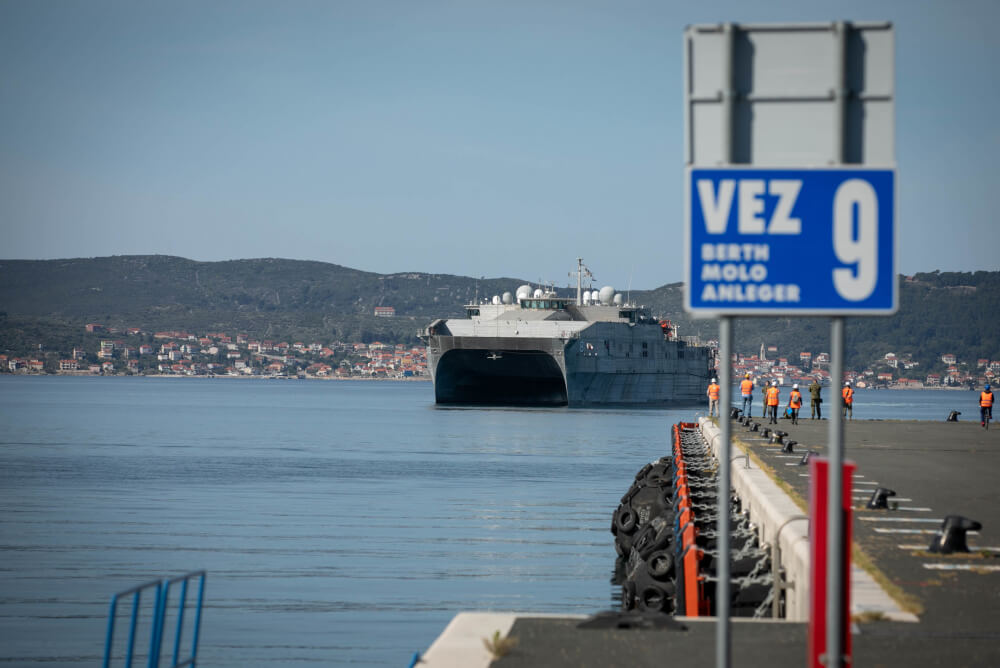
U.S. Naval Ship Yuma arrives in Zadar, Croatia © Sgt. Alexandra Shea
As part of the exercise, U.S. Naval Ship Yuma and U.K. Vessel Hurst Point off-loaded more than 300 pieces of military equipment in Zadar, Croatia’s Gazenica port, after ferrying it from Durres in Albania. The delivery started on Tuesday, May 4, and it was concluded on Friday. The journey of the equipment started back on March 24 at the Port of Jacksonville in Florida. The local U.S. National Guard units were shipping the equipment for three days onto USNS Bob Hope (T-AKR 300) after which, the ship stopped by Portsmouth in Virginia for the final pieces of equipment before heading towards Durres in Albania. In Durres, the smaller vessels took the equipment and finally loaded it to Yuma, and Hurst Point, which brought it to the gem of Northern Dalmatia, Zadar.
„This process is called Joint Logistics Over-the-Shore, a method used to ensure swift delivery of supplies and equipment in a variety of port situations“, explained the press release.
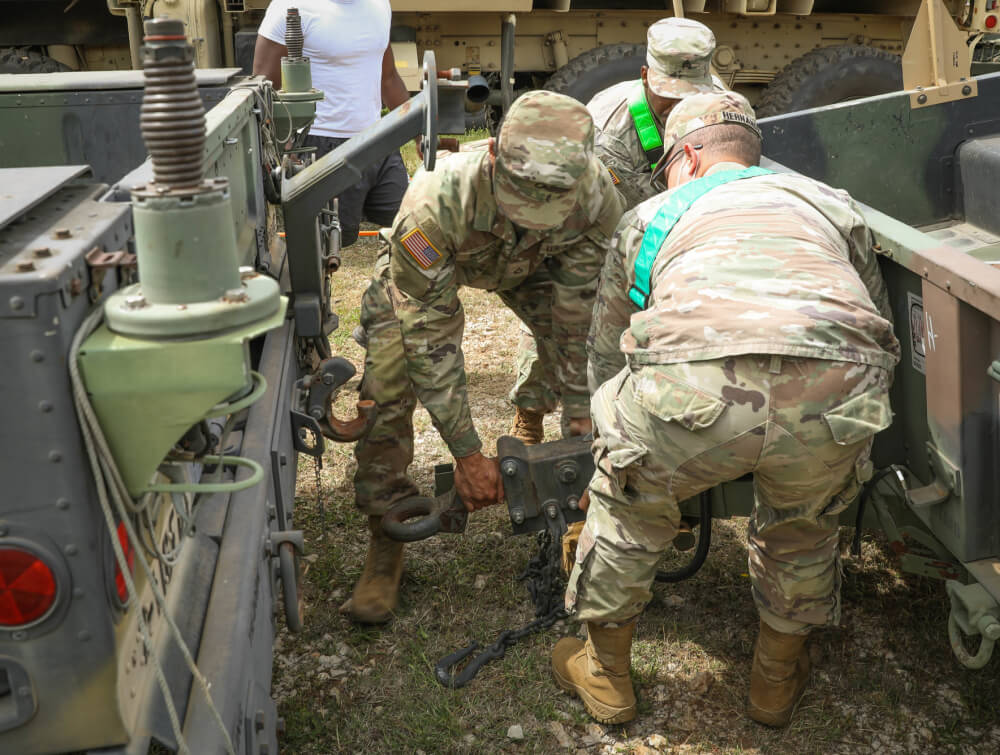 U.S. equipment leaves for training area © Sgt. Joshua Oh
U.S. equipment leaves for training area © Sgt. Joshua Oh
While many would probably stop at Zadar and chill for a lovely holiday, the equipment, however, will continue its journey. Part of the equipment will remain in Croatia, but it will be transferred to Slunj, home of the Main Training Area, and the rest goes to training areas scattered in Bosnia and Herzegovina (BiH). In BiH, the drills and maneuvers for which the equipment will be used are under the umbrella of the linked exercise named "Immediate Response 21” which will culminate in a joint, multinational live-fire demonstration called “Croatian Rampart 1991-2021” at the end of May. Not just as a test of possibility in the „God-forbid-we-are-attacked“ scenario, Croatian Rampart 1991-2021“ also celebrates the 30th anniversary of the Croatia Armed Forces.
The Main Training Area in Slunj, Croatia and training areas throughout Bosnia and Herzegovina to be used in drills and maneuvers alongside members of the Croatian Armed Forces, under the umbrella of the linked exercise named "Immediate Response 21.” The exercise culminates in a joint, multinational live-fire demonstration called “Croatian Rampart 1991-2021” - which celebrates the 30th anniversary of the Croatian Armed Forces at the end of May.

British Major Dan Cornwell talking to Croatian press, screenshot / Defense Flash News
British Major Dan Cornwell told the Croatian press that the idea of being in Zadar is that Croatian, U.K., and U.S. forces operate together in loading U.S. equipment and personnel.
„We've done this before, on exercise last year in Germany, and I can say, it's a lot better down here in the south, it's absolutely amazing to be here in Croatia to do this alongside Croatian Armed Forces where we can better understand how we operate differently, how we operate similarly and equally building up our interoperability and our ability to operate better in the future“, said Maj. Cornwell, indicating that perhaps he can find Zadar, like many others, as a great holiday destination and not just the line of duty.
Learn more about Zadar on our TC page.
For more about the army in Croatia, follow TCN's dedicated page.
$480,000 Invested in Upgrade of Rijeka's Offshore Emergency Response Centre
ZAGREB, 16 March, 2021 - The refurbished building housing Rijeka's Maritime Crisis Centre for Faster Response to Any Disaster off Croatia’s Coastline was officially opened on Tuesday.
The investment into the upgrade of this offshore emergency response centre in the biggest Croatian seaport totalled US$ 480,000, and the lion's share of the investment was provided by the U.S. Army Corps of Engineers.
During the ceremony, the state secretary of the Croatian Sea, Transport and Infrastructure ministry, Josip Bilaver, thanked the U.S. administration and military as well as the US Embassy in Zagreb for this donation in the amount of HRK 3.2 million.
The ministry has invested a million kuna, while the local county authorities provided 100,000 kuna for the project.
"The U.S.-Croatia partnership at sea is essential to the two countries’ NATO military cooperation and shared security. That is why the United States, through the U.S. Military’s European Command (EUCOM), provided assistance to the Croatian Ministry of Sea, Transportation and Infrastructure and the Rijeka Harbor Master’s office to advance training and emergency-response capabilities at sea," the embassy said on its website.
The U.S. Chargé d’Affaires Victoria Taylor, who today joined State Secretary Bilaver for the ribbon-cutting ceremony, expressed satisfaction with the completion of this project.
Over the last decade, the USA has set aside HRK 4.5 billion to support numerous civilian and military projects in Croatia, she said.
The Rijeka centre is described as a a renewed facility that will become "the central point for planning, training, and management in response to emergencies at sea, from supporting persons and vessels in need to addressing maritime accidents and oil pollution."
"The upgraded center will therefore play a critical role in maintaining the safety and environmental stewardship of Croatian coastal waters, ensuring quick action in response to a potential environmental disaster. Protection of the environment is a key priority for both Croatia and the United States, and joint capacity to mitigate against incidents and accidents at sea can make all the difference in a crisis."
The embassy recalls that "Rijeka is already a hub for U.S.-Croatia cooperation, with the port city benefiting economically from nearly 900 million kuna in contracted services by the U.S. Navy for ship maintenance and support since 2011."
For more about politics in Croatia, follow TCN's dedicated page.
Global Terrorism Index 2020: Croatia is a Completely Safe Country
ZAGREB December 2, 2020 – Croatia is a completely safe country, according to the latest figures from the Global Terrorism Index
According to the Global Terrorism Index, Croatia is a completely safe country. Their findings are reported annually by the Institute for Economy and Peace. In their most recent report (published late November 2020), from the year beginning 2018 and ending in 2019, Croatia scored an index rating of 0.0 on the impact of terrorism. This means that, in regards to the threat of and the fallout from terrorism, Croatia is a completely safe country.
In the report, terrorism affects most the citizens of three countries: Afghanistan, Iraq and Nigeria. Terrorist groups are powerful and active in these three nations. On a daily basis, they affect and change the lives of all the people who live in these countries, particularly those who inhabit larger population centres.
The situation is particularly tragic in Afghanistan (with an index rating of 9.5). 41% of all fatal victims of terrorist globally live in that one country alone. The second country most-affected on the list is Nigeria with 9%. Afghanistan and Nigeria were the only two countries which each suffered more than 1,000 deaths from terrorism.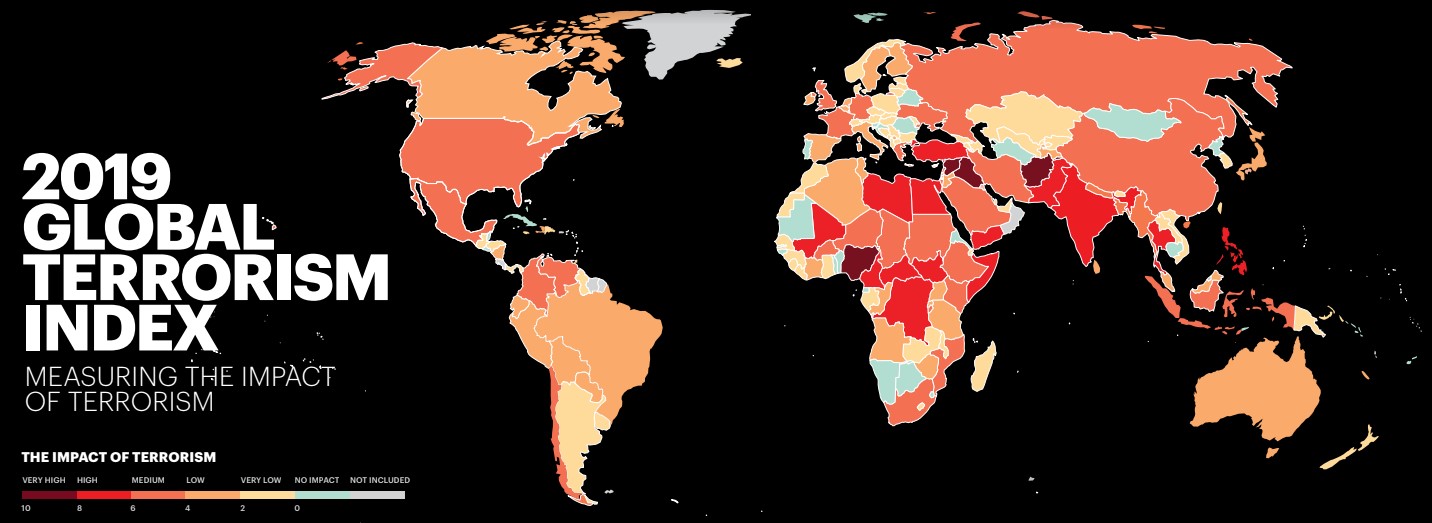 A map showing the impact of terrorism globally. The figures were compiled in a one year period between 2018 and 2019, published as an annual report in late November 2020 © Institute for Economy and Peace (IEP)
A map showing the impact of terrorism globally. The figures were compiled in a one year period between 2018 and 2019, published as an annual report in late November 2020 © Institute for Economy and Peace (IEP)
Globally deaths from terrorism fell for the fifth consecutive year in 2019 to 13,826, a 15 per cent decrease from the prior year. The peak of deaths from terrorism occurred in 2014 and this coincides with the high point of influence of the Islamic State of Iraq and the Levant (ISIS or ISIL). The figures from 2019 show a decrease of 59% since then.
A total of 63 countries recorded at least one death from terrorism in the most recent report. Although dismal reading, this is in fact the lowest number of countries to have reported such since 2013.
The global economic impact of terrorism was US$16.4 billion in the twelve-month period covered by the report, a decrease of 25 per cent from the previous year. However, the true economic impact of terrorism is much higher as these figures do not account for the indirect impact on business, investment, and the costs associated with security agencies in countering terrorism.
ISIS (or ISIL)'s centre of activity has been shown to have moved to sub-Saharan Africa in the period. Total deaths by ISIL in the region have increased by 67%. ISIL and their affiliates were also responsible for attacks in 27 countries in the year period ending 2019.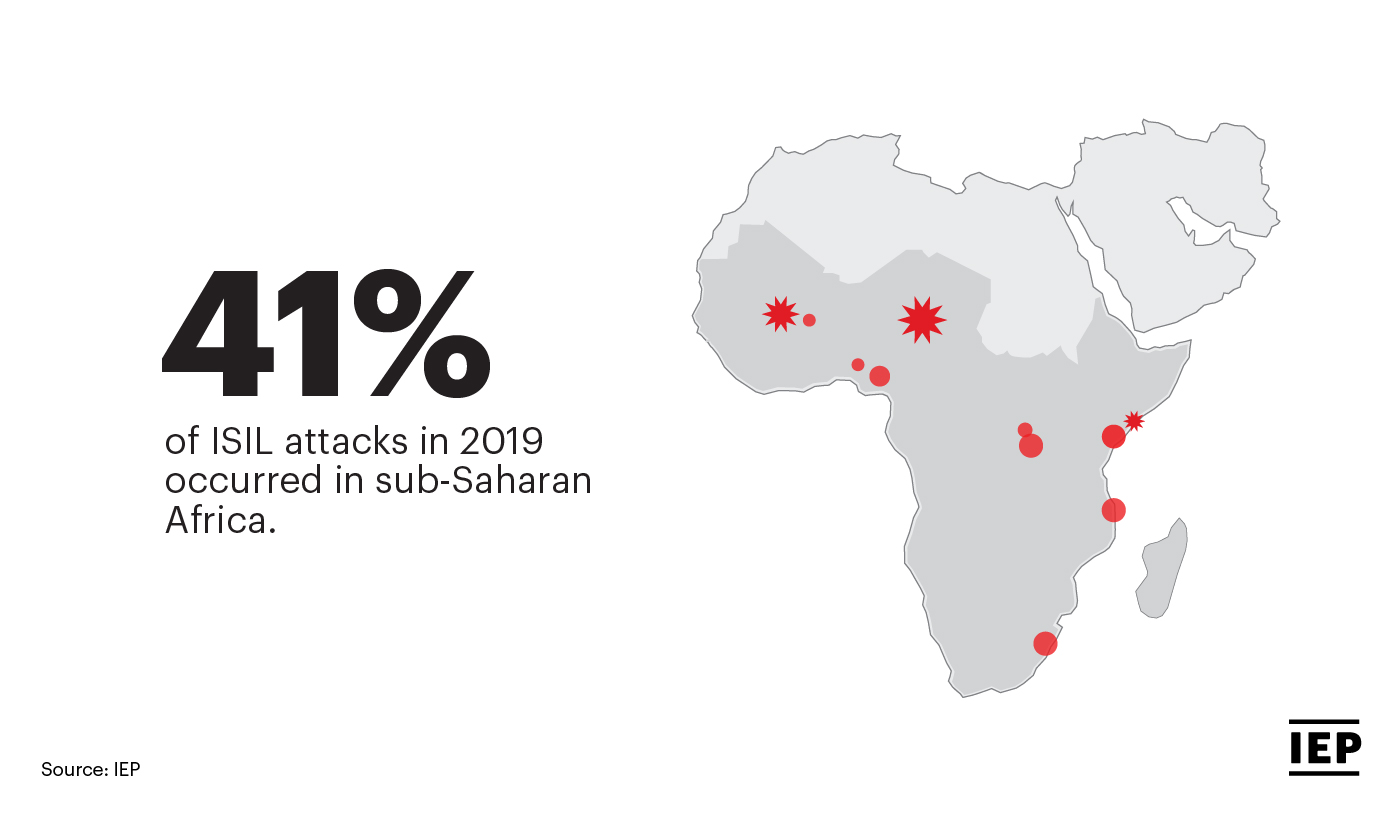 © Institute for Economy and Peace (IEP)
© Institute for Economy and Peace (IEP)
The GTI uses a number of factors to calculate its score, including the number of incidences, fatalities, injuries and property damage. The Taliban remained the world's deadliest terrorist group in 2019; however, terrorist deaths attributed to the group declined by 18%. ISIL's strength and influence also continued to decline. For the first time since the group became active, it was responsible for less than a thousand deaths throughout the year.
It is not yet known whether the attack on government buildings in Zagreb in 2020 will affect Croatia's rating on the index published next year. Although a lone endeavour, Croatian Prime Minister Andrej Plenković is the most high-profile commentator (of many) to have said the attack had elements of terrorism. The global increase in threat from domestic attacks is clearly evident within the rest of the most recent report.
In North America, Western Europe and Oceania, terrorist attacks by groups or individuals involved in far-right politics have increased by 250 per cent since 2014. They are now higher than at any time in the last 50 years. There were 89 deaths attributed to far-right terrorists in 2019. In the USA, white supremacists and other rightwing extremists have been responsible for 67% of domestic terror attacks and plots so far this year.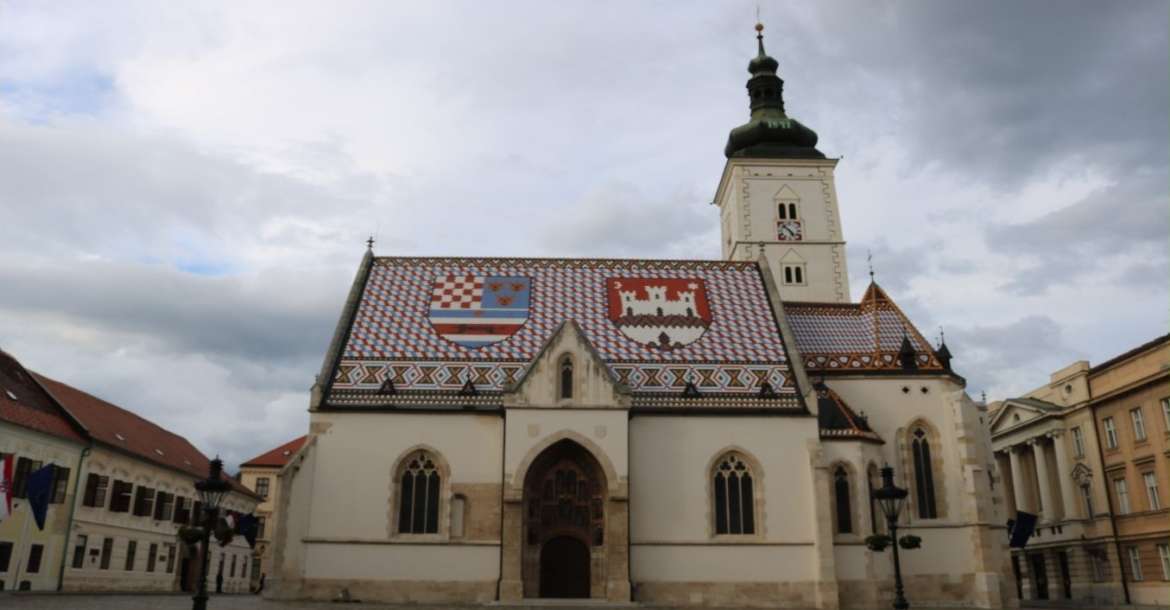 Saint Mark's Square in Zagreb, scene of a shooting in 2020, perpetrated by a Croatian citizen © Marc Rowlands
Saint Mark's Square in Zagreb, scene of a shooting in 2020, perpetrated by a Croatian citizen © Marc Rowlands
There have so far not been any terrorist actions attributable to fundamentalist Islamic groups in Croatia, unlike other European countries such as Spain, Germany, France and the UK. Eastern and southern Europe have experienced more civil unrest in direct correlation with the rise of far-right politics in the region. The popularity of far-right politics has risen ever since the 2008 financial crisis and has continued through the economic recession which followed.
Such trends are expected to continue because of the anticipated and extended economic downturn caused by COVID-19, which is likely to increase political instability and violence. Since COVID-19 was declared a global pandemic by the World Health Organization (WHO) in March 2020, preliminary data suggests a decline in both incidents and deaths from terrorism in most regions in the world. However, it is expected that the pandemic is likely to present new and distinct counter-terrorism challenges.
Of Croatia's neighbours, Bosnia and Herzegovina recorded the largest improvement in the whole of Europe with their 2019 index rating (followed by Austria and Sweden). Only two terrorist attacks were recorded in the country in 2019, compared to six the previous year. Slovenia also scored a 0.0 rating, meaning it can say that it, like Croatia is a completely safe country.
SOA Says State of Security Stable in Croatia
ZAGREB, September 21, 2020 - The security situation in Croatia is stable, and in 2019 there were no event or occurrence which could have constituted a threat to the security circumstance in the country, the Security and Intelligence Agency (SOA) has reported.
There are currently no indications of potential destabilisation of the state of security in the country, reads the SOA report which was made public on Sunday.
Terrorism threat level low
Croatia's current national terrorism threat level continues to be low.
Although the possibility of a terror attack cannot be ruled out, in 2019 there were no indicators of rising threat of terrorism in the country.
The biggest risk concerning this issue are regional followers and sympathisers of Islamist terror organisations and returnees from Syria/Iraq, according to the report.
Seven persons with Croatian citizenship moved into the areas under the control of the Islamic State (ISIL), and two of them were men and five women.
The available data shows that during 2017 and 2018 the two men and a woman died in the Syria/Iraq region and the remaining women of Croat origin are still in civilian camps under the control of Kurdish and Arab forces.
SOA also highlights the fact that not any form of extremism has any strength or potential to topple the democratic constitutional order in Croatia.
The report notes that western Europe is faced with the strengthening of right-wing or anti-immigrant extremism, however, Croatia has not registered any serious anti-immigration extremist movement on its soil.
Islamist radicalism has spread on the southeast of Europe with a marked number of followers, while in Croatia it is marginal with just a dozen people having embraced Salafism, however, they have not shown any inclination to advocate violence.
A risk for the security situation in European societies can be returning "jihadists", and for instance Croatia's neighbours in southeast Europe have reported an estimated 1,000 people who are believed to move to Syria/Iraq to join ISIL. Of that number, a quarter (25%) have died in the Middle East, 30% are still there, and 45% have returned to their countries of origin in southeast Europe.
During 2019, 136 people returned from Syria to those countries in southeast Europe, and of them 12 were fighters who fought for ISIL, while the remaining were women and children.
Five APT cyber attacks countered in 2019
The SOA agency reports that during last year, the authorities detected and stopped five Advanced Persistent Threats (APTs) and some of those attacks had been directed against the ministries of foreign affairs and defence.
So far this year, APT has increased in intensity, and APT attacks are using the circumstances marked by the COVID-19 pandemic. In order to response to these challenges, SOA has set up a centre for cyber and information security.
Concerning the fight against narcotics trafficking, SOA recalls that recently the police in the Canary Islands have seized close to a tonne of cocaine worth more than €40 million, in an operation launched by the Croatian police. Croatia's law enforcement authorities had collected initial information about the transoceanic smuggling of large quantities of cocaine in which Croatian nationals were involved as members of the so-called Balkan cartel.
The operation to break the smuggling ring was carried out in cooperation with the Spanish Civil Guard and French customs authorities. It was also supported by Europol, the Drug Enforcement Administration - Zagreb Office, the UK National Crime Agency, Dutch police, and Bosnia and Herzegovina police.
Security circumstances in Croatia's southeast neighborhood unstable
The countries in Croatia's southeast neighborhood are encumbered with a lot of security, political, economic and social challenges.
Religious and ethnic nationalism still constitutes a problem in those countries.
Occurrences linked to Great Serbia extremism are noticed in some countries and they are evident through attempts to deny the territorial integrity and sovereignty of Croatia as well as of Kosovo, Bosnia and Herzegovina and Montenegro, reads the report.
This extremism is manifest in public appearances and speeches as well as rallies of Great Serbia extremist organisations.
Advocates of Great Serbia extremism are trying to stoke up anti-EU and anti-NATO mood in the southeast of Europe, and are promoting their attachment to Russia.
The report reads that radical interpretations of Islam are still present in southeastern European countries. There are enclaves in which some communities are practising radical Islamic doctrines and do not recognise the law and the democratic order of the countries in which they live, which SOA identifies as a security risk.
Emigration deteriorates position of Croats in Bosnia and Herzegovina
Apart from the political situation in which they are trying to reach the full equality with the other two constituent peoples in Bosnia and Herzegovina, the Bosnia and Herzegovina Croats are also facing a trend of economic emigration, and the further downsizining of this community will affect their survival and consequently the multi-ethnic nature of Bosnia and Herzegovina.
When it comes to the topic of irregular migrants, their numbers have been rising on the eastern Mediterranean route. The Frontex statistics show that along this route, which is also called the Balkan route, there were an estimated 82,000 illegal migrants last year, or 46% more than in 2018.
The report underlines that Croatia should strengthen its energy independence and that the LNG terminal would boost the energy security of the country and its neigbours.
The SOA also highlights that white-collar crime and corruption can stifle the economic development of the country.
For the latest travel info, bookmark our main travel info article, which is updated daily.
Read the Croatian Travel Update in your language - now available in 24 languages


